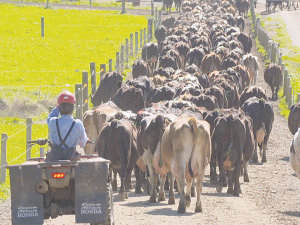Hawke’s Bay sheep and beef farmers warned to monitor stock water wells
Sheep and beef farmers in Hawke's Bay are being urged to keep a close eye on the wells that supply water to their stock.
 Waikato Federated Farmers executive Richard Myers says farmers need to follow directors from their processors on sustainability.
Waikato Federated Farmers executive Richard Myers says farmers need to follow directors from their processors on sustainability.
Farmers must follow directives from their processors on sustainability or risk losing markets for their products, says Waikato Federated Farmers executive Richard Myers.
He says dairy farmers are interlinked with their processors and cannot ignore the sustainability targets they set.
Myers was reacting to comments by Canterbury farmer and former Feds dairy chair Willy Leferink (Dairy News November 28th issue), who believes that farmers should be wary that milk processors don’t take over management of dairy farms under the guise of scope 3 emissions target.
Leferink, who has a sharemilker on his 200ha Canterbury farm and supplies Synlait, says if applied correctly, scope 3 targets might deliver some easy wins, like tidying up particularly those farmers who drag the chain on sustainability.
However, he warns that if reducing emissions intensity on farm becomes a box ticking exercise, then it won’t mean anything. Fonterra recently announced that they plan to reduce their on-farm emissions intensity 30% by 2030. It’s a co-op wide target.
But Myers points out that sustainability isn’t a debate about farmers running their own farms.
“Farmers need to understand why we need to reduce our greenhouse gas emission,” he told Dairy News.
“For Fonterra, dairy farmers have been set a target of 30% reduction of GHG emissions by 2030. Farmers must focus on what their customers ask for, when they buy our products, their specifications.
“They pay us our returns for the products we produce. We want to continue to retain our high value customers like Nestle, Mars, Starbucks, Yum Brands.” Myers says banks are now also asking that farmers address these climate issues.
“We have legal and reporting obligations from Government to go down this track and We want to be leaders in sustainability.
“Dairy farmers are interlinked with their processors which means we must listen to their directives: we must be customer led.”
Myers, a Fonterra supplier, says the co-operative board and management are in complete agreement on Scope 3, so it is over to farmers to act.
“It is going to be harder for some farmers than others, so there needs to be support for them.
“Some of the less efficient farmers may drop out but that doesn’t mean we change the objectives. It is important that our leading farmers set the standards and DairyNZ help the others to learn and adopt best practice.”
The Meat Industry Association (MIA) is once again looking for game-changing ideas for New Zealand's red meat processing and exporting sector.
Environment Southland is inviting feedback on two bylaws that play a critical role in safeguarding the region's waterways and ensuring the safety of the local community.
While the North Island is inundated with rain, Southland is facing receding water levels as warm weather and lack of rainfall continues.
Entries have opened for the 2026 Fieldays Innovation Awards.
Organisers are expecting another full field of 40 of the country’s top shearers for the popular Speed Shearing event at this year’s Southern Field Days at Waimumu.
The Southern Field Days Innovation Awards have a great record in picking winners and the winner of the 2024 event will be putting up a display to support the event at this year’s show.